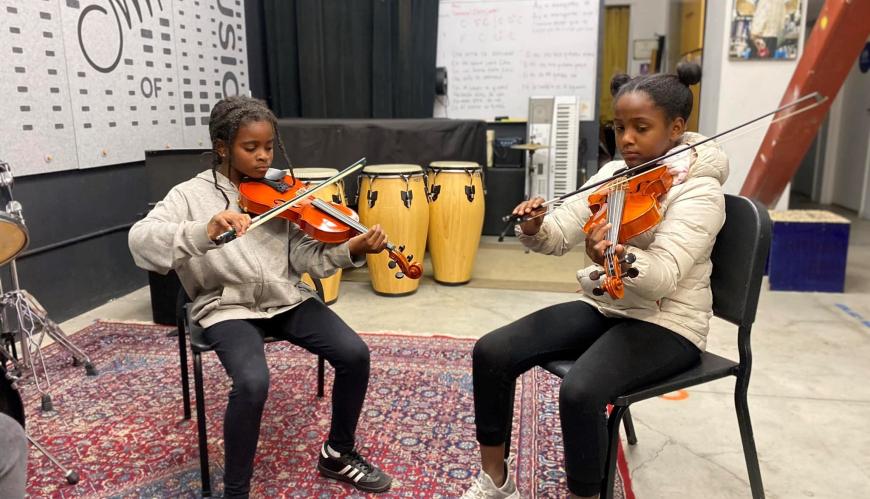
Despite near universal acknowledgment of the debt American music owes to Black musicians and musical culture, it can be hard to find schools focused on teaching those traditions. But Oakland, with its long history of Black culture and pride, has two of them.
One is the Oakland Public Conservatory of Music (OPC), which offers community events that have included the Count Basie Orchestra, Zimbabwean musician Ronnie Daliyo, Oakland percussionist John Santos, and the Carolina Chocolate Drops with founding member, fiddler, and banjo player Rhiannon Giddens.
The conservatory also has master classes and workshops for both adults and children. One of its programs, Black Girls Play, is for 11- to 24-year-olds who want careers in the music industry.
Angela Wellman, who founded OPC in 2005, got a grant to start the program from the NoVo Foundation, established by Warren Buffet’s son to help organizations that empower girls of color. And that’s what OPC does, she says.
Wellman, who was getting ready to go to Brazil for a residency with the Black Freedom Fellowship when she talked to SF Classical Voice, said the conservatory gives girls a chance to relax and be themselves. She finds it encouraging to witness OPC’s teachers and mentors in the music industry — all Black women — working with students.
It’s an “absolute delight,” she said, “to see [those teachers] participating and contributing to an experience where every last one has said, ‘God, if there had been a program like this when I grew up,’ because so many of them, like me, were the only one in too many environments. And the people who care most about Black girls are Black women. So that’s been really, really powerful.”
Wellman grew up in a musical family in Kansas City, Missouri. Her father and grandfather were pianists, and her mother and grandmother were singers. A professional trombonist, Wellman came to Oakland in 1984, thinking she’d be there for a year or so, but she ended up staying and substituting in the schools.
She remembers one job at an arts school in West Oakland where she brought in a piece by the Art Ensemble of Chicago that she thought would interest the students. “I asked them, ‘So what is jazz?’ and this little girl said, ‘White people music.’ I was like, ‘OK, I’ve got some work to do here.’”
Wellman went on to get her master’s in music education at the Eastman School of Music in Rochester, New York. She became a music teacher in the Oakland schools and eventually founded OPC, influenced by her undergraduate experience.
“My teacher at the [University of Missouri–] Kansas City Conservatory did not teach me what I wanted him to teach me, which was to be an orchestral trombonist,” Wellman said. “One of the fundamental reasons I created a public conservatory of music was to create a space where Black children, or any children, could come and study whatever they wanted to learn. I wanted them to have access. If it’s Mozart or James Brown, I don’t care. Like Duke Ellington said, ‘There’s good music and bad music.’ So, I very much live by that.”
Recently, Wellman got her doctorate from the University of Wisconsin–Madison with the aim of writing a music curriculum that centered on the banjo, which she calls the quintessential American instrument. Receiving funding for OPC’s inaugural Black Banjo & Fiddle Fellowship (BBFF) this spring was particularly meaningful. BBFF provides four musicians with a two-year fellowship that “aims to repatriate old-time music in African American communities and illuminate the Black experience in creating old-time music.”
One of the fellows, Darcy Ford-James, teaches strings at a Stockton high school and founded Stockton Soul, a student orchestra performing Black American music. Ford-James says BBFF offers her exactly what she’s interested in learning.
Like Wellman, Ford-James grew up in a musical family. She went to Stockton’s University of the Pacific and studied violin performance. But in school, the music that her family listened to and that she loved was left out, which made her feel like there was something wrong with it. She co-founded Stockton Soul because she didn’t want her students to feel the same way.
Ford-James applied for BBFF after hearing Rhiannon Giddens talk about the Black roots of the fiddle and banjo on a podcast. Learning about this has been revelatory, Ford-James says. Her white grandfather was a honky-tonk musician during the Great Depression who continued to play all his life and wanted her to accompany him. She felt conflicted about the stereotypical image of this genre, but through OPC’s fellowship program and learning the history of how different types of music were segregated and marketed, her perspective has changed.
“There’s a reason I had that idea that white music was a racist, hillbilly-type music, and to learn that it originated with African Americans during slavery just made it OK for me,” she said. “It also made me so emotional. I heard the podcast when I was on a walk, and I started crying. I was thinking about my grandfather and how I have his father’s violin and his fiddle and I’m getting to learn this music, and I just feel integrated.”
Living Jazz
Living Jazz, another public conservatory in Oakland, also offers programs for both adults and kids. Lyz Luke, the organization’s executive director, believes Living Jazz offers a way for people of all ages to come together. A cornerstone of the organization, she says, is the annual Jazz Camp West each June.
“We had about 320 people for eight days straight learning from each other,” she said. “We had music and dance classes in the day, and we would have open mics and jam sessions and faculty concerts in the evening until the wee hours of dawn under the redwoods.”
In the last few years, Luke says, younger people hadn’t been coming to the camp. The organization made major changes this year to get them there. And it worked. Luke says 100 people under 35 attended this summer.
“It was just such a change of energy,” she said. “We were told by many people it was the best camp they’ve ever gone to, and they’ve been coming for 20 years.”
Luke says Living Jazz accomplished this by changing its approach. Rather than spending more on advertising, it funneled this money toward scholarships and discounts for younger musicians. Also, the organization reached out to people individually instead of sending out email blasts.
The best part of the camp for Luke was the intergenerational learning — something she says was the norm for her growing up in an Indian household. She saw this particularly in the late-night jam sessions, for which tapestry rugs and bistro lights were set up.
“The younger campers were chomping at the bit and so excited every night to learn from these incredible musicians,” she said. “It’s providing a space where everyone is equal. We had a woman probably in her 80s get up at the microphone, and she said, ‘As I move through the world, the older I get, the more and more invisible I feel, but not here at Jazz Camp. I feel seen.”
The city of Oakland makes Living Jazz what it is, Luke says. “I think Oakland is part of our product, if you will. Like that sense of resiliency, that sense of counterculture, that sense of social change and social justice and honoring the roots and the culture of the music and of Oakland itself — that runs through everything that we do.”



